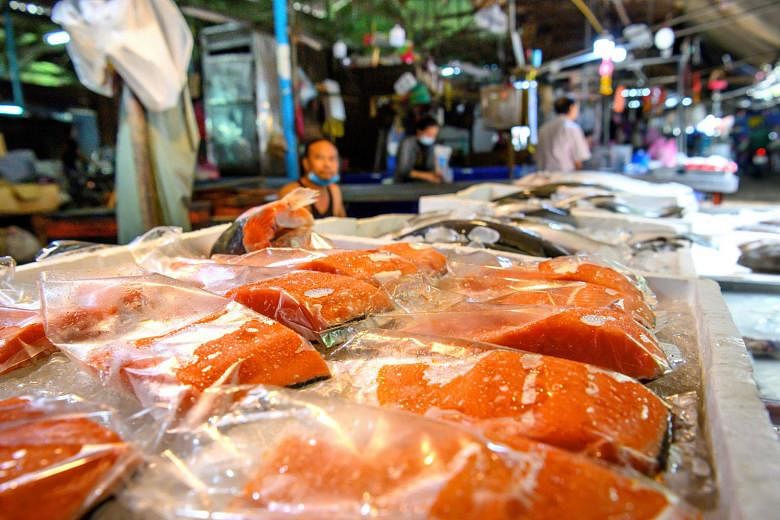BEIJING • When a new coronavirus outbreak emerged last week in Beijing, residents were jolted by reports that traces of the virus had been found on a cutting board used for imported salmon, and the response was swift.
Within a few days, salmon was removed from major supermarket shelves in Beijing, reserves of the fish were dumped and bulk orders evaporated. Diners rushed to cancel reservations at Japanese restaurants in the Chinese capital, while salmon suppliers around the world scrambled to salvage the tarnished reputation of their prized product in the country.
Chinese officials later said that imported salmon was not responsible for spreading the virus, but the damage had already been done. "The unluckiest restaurateur of 2020," said Mr Alan Wong, owner of Hatsune, a chain of Japanese restaurants in Beijing and Shanghai. "That's my title."
"We were packed on Friday and now dead ever since," he said this week. "Totally empty."
In a country where fears of the virus remain strong and nationalism is on the rise, imported salmon has found itself to be an easy target.
Facing global criticism for its initial mishandling of the virus outbreak, the Chinese authorities have for months waged a propaganda campaign to highlight their successes in taming the virus and deflect blame for the pandemic to outsiders. They have cast foreigners as public health risks, sowed doubt about the virus' origins and pushed an unfounded conspiracy theory that the US military had deliberately brought the virus to China.
After the chairman of the wholesale market linked to the latest outbreak told a Beijing News reporter that the virus had been found on a cutting board used for salmon, panic ensued.
Last Saturday, Dr Zeng Guang, a senior epidemiologist at the Chinese Centre for Disease Control and Prevention, was quoted in the Global Times as urging people to stop eating raw salmon for now.
For years, China's growing appetite for salmon, like American lobsters, oysters and cherries, had been celebrated as a sign of the country's rising living standards and burgeoning middle class. Now, the luxury good, which is mostly imported from Norway and Chile, is being cast out.
On Thursday, Chinese health officials said the seafood and meat sections of the Beijing wholesale food market linked to the outbreak had been found to be contaminated with the virus, and that low temperatures and high humidity there may have contributed to the spread.
For the many salmon suppliers and restaurateurs who were already struggling to claw their way back in the aftermath of the pandemic, the sudden boycott in China has dealt an unexpected blow.
Like many other restaurant owners in China, Mr Wong of Hatsune was forced to close several of his 15 restaurants after the epidemic exploded in the country in late January. The remaining restaurants were beginning to return to pre-pandemic levels of business earlier this month.
Then reports began circulating last Friday about the contaminated cutting board, and customers like Ms Alyssa Mai, 19, a college student from Guangzhou, said that while she knew the risk of getting the virus from eating salmon was low, she would not have it any time soon.
NYTIMES

